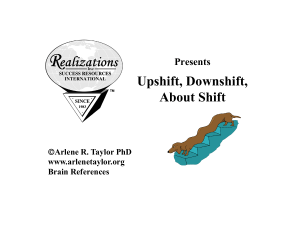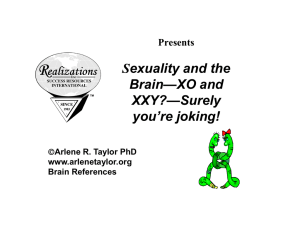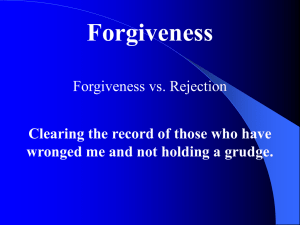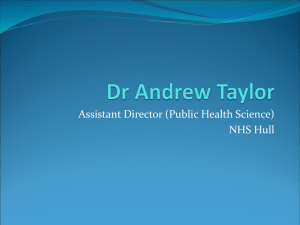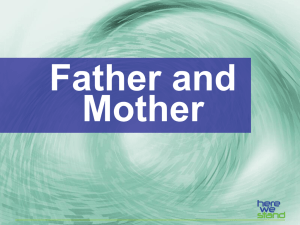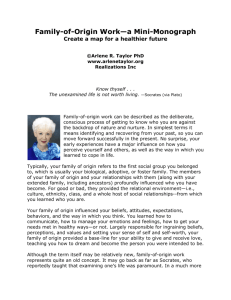Presents The Physiology of Forgiveness
advertisement
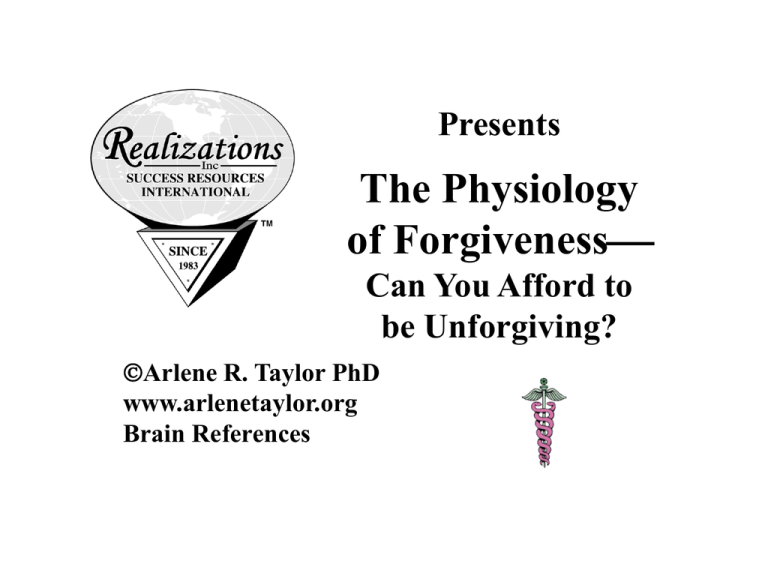
Presents The Physiology of Forgiveness Can You Afford to be Unforgiving? Arlene R. Taylor PhD www.arlenetaylor.org Brain References Health and Forgiveness Arlene R. Taylor PhD Realizations Inc There’s something called the ‘physiology of forgiveness’ being unable to forgive other people’s faults is harmful to one’s health —Herbert Benson MD Forgiveness is Scriptural Arlene R. Taylor PhD www.arlenetaylor.org Forgive and you will be forgiven —Luke 6:37 Forgive as the Lord has forgiven you. —Colossians 3:13 Forgive us our debts as we also have forgiven our debtors —Matthew 6:12 If you do not forgive (others) their sins, yours will not be forgiven —Matthew 6: 15 Forgiveness Doesn’t Mean Arlene R. Taylor PhD www.arlenetaylor.org Denying the other person’s responsibility for the wrong Condoning bad behavior: minimizing, justifying, or excusing the injury / wrong Waiving right to justice / compensation Choosing to reconcile or remaining in an abusive relationship / environment If a Crime Is Involved Arlene R. Taylor PhD Realizations Inc Forgiveness has NOTHING to do with absolving a criminal of his/her crime . . . It has EVERYTHING to do with relieving oneself of the burden of being a victim—letting go of the pain and transforming oneself from victim to survivor. C. R. Strahan What Forgiveness Is Arlene R. Taylor PhD Realizations Inc You give up your right to exact retribution from the individual who hurt or wronged you You choose to think about something else rather than harboring resentment You refrain from repeatedly bringing up the incident to yourself and/or others Forgiveness is About YOU Arlene R. Taylor PhD www.arlenetaylor.org Studies have shown clearly: 1. The one who is unforgiving suffers the most 2. The one to be forgiven does not need to know or even still be alive 3. Forgiveness benefits the forgiver (you) the most Forgiveness Type Confusion Arlene R. Taylor PhD Realizations Inc Some confuse human forgiveness with Diety forgiveness ― perhaps because many religions emphasize how completely God forgives Humans cannot forgive at that level but they can forgive Human forgiveness is far less about “others” and far more about “you” How God Forgives Arlene R. Taylor PhD Realizations Inc Praise the Lord . . . who forgives all your sins and heals all your diseases ―King David, Psalm 103: 2-3 NIV Will tread our sins underfoot and hurl all iniquities into the depths of the sea ―Jeremiah 31:34 Will forgive their wickedness and remember their sins no more —Micah 7: 19 Reasons to Forgive Arlene R. Taylor PhD Realizations Inc 1. It’s the right thing to do because all human beings make mistakes and fall short of the ideal 2. In order to receive forgiveness for your mistakes 3. To preserve your healthif you choose unforgiveness, you will likely be the one who pays most dearly Two Types of Forgiveness Arlene R. Taylor PhD Realizations Inc At least two types of forgiveness pop up in the literature: decisional and emotional Decisional forgiveness A behavioral intention to resist an unforgiving stance A choice to respond differently toward a transgressor (letting go of bitterness, grudges, resentment, and revenge) Two Types, Cont’d Arlene R. Taylor PhD www.arlenetaylor.org Emotional forgiveness: The replacement of negative unforgiving emotions with positive other-oriented emotions Involves psychophysiological changes Has greater positive direct health and well-being consequences Caveat Arlene R. Taylor PhD www.arlenetaylor.org Humans tend to remember and rehearse what they thought they’ve forgiven The cemetery metaphor can be helpful Bury all the mistakes, injuries, and wrongs that you have forgiven No headstones! That way you can’t go back and dig up what I’ve forgiven and buried Break Time! Part Two after the break Forgiveness Health Impact Arlene R. Taylor PhD Realizations Inc Psychoneuroimmunology (PNI) research: what you think about can alter levels of several chemicals in your brain and body Every thought you think alters your neurochemistry changes the chemical composition in your brain and body, impacts your energy, and enhances or suppresses immune system function You May Say . . . Arlene R. Taylor PhD www.arlenetaylor.org But no one knows I’m unforgiving . . . Your brain and body know and long term this will have impact your health Examples: Anger - adrenalin, dopamine Sadness - serotonin Laughter - dopamine, serotonin, and endorphins Thoughts Mental Picture Arlene R. Taylor PhD www.arlenetaylor.org I hate ______ and I won’t forgive . . . \ I regret what happened and I forgive ______ for the benefits I receive Your choice will impact both brain and body The Health Connection Arlene R. Taylor PhD www.arlenetaylor.org When you say “I forgive you,” you’re also saying “I want to be healthy” The act of forgiving allows the body to turn down the manufacture of catabolic chemicals, and instructs the subconscious to banish negative feelings from the mind Doctors Arnold Fox and Barry Fox Authors of Wake Up! You’re Alive! Grid Study Arlene R. Taylor PhD Realizations Inc By thinking (imagining) your brain changes Grid Study results: Actual experience Virtual experience PET Scans showed little if any difference in changes to brain imaging print-outs Brain-Body Arlene R. Taylor PhD Realizations Inc Neurons (thinking cells) are found in the brain and many other places in the body, including: • Heart (40,000+ neurons) • Solar Plexus (large clusters) • GI Tract (1,000,000 neurons, 90% of the serotonin and 50% of the dopamine in your brain and body) The Health Impact Arlene R. Taylor PhD Realizations Inc If you choose unforgiveness, studies have shown negative side affects, including: • • • • stress levels and muscle tension levels of adrenaline and cortisol blood pressure and heart rate risk for depression, heart disease, stroke, and cancer • Suppressed immune function • Impaired neurological function / memory Health Impact, Cont’d Arlene R. Taylor PhD www.arlenetaylor.org If you choose decisional and emotional forgiveness, studies have shown positive outcomes, including: • • • • • • • Healthier relationships Lower blood pressure Less anxiety, stress, and hostility Fewer symptoms of depression Lower risk of alcohol / substance abuse compassion, kindness, and peace mental, physical, and spiritual health To Forgive or Not to Forgive Arlene R. Taylor PhD www.arlenetaylor.org Unforgiveness results in negative outcomes to your health and overall wellbeing Forgiveness results in positive outcomes to your brain and body, receiving forgiveness for your negative-consequence behaviors, and increase health and wellbeing Summary Guidelines Arlene R. Taylor PhD Realizations Inc Although humans never forgive at God’s level, they can follow guidelines: 1. Choose to forgive - step 1 and step 2 2. Bury what you forgive - no headstones 3. Stop talking about them – no rehearsing 4. Be healthy and prosper – even as your soul prospers Practical Application Arlene R. Taylor PhD Realizations Inc As a Preacher’s Kid and dealing with critical church members, my father said he found the parable of the sower helpful A phone call last week reminded me of some of those childhood experiences It had to do with Soquel Campmeeting . . . Observations Arlene R. Taylor PhD Realizations Inc People who have a strong spiritual ethic tend to be forgiving at both step 1 and step 2 Those who are religiously rigid—but not very spiritual—may be less forgiving and more critical, judgmental, and even vindictive Middle-Ages persecution Palestinian wars Iraq-Pakistan conflicts Forgiveness is About You Arlene R. Taylor PhD Realizations Inc 1. Do you want forgiveness? 2. Who do you need to forgive? 3. How big is your cemetery? 4. How healthy do you want to be? It’s your choice… —The End—
